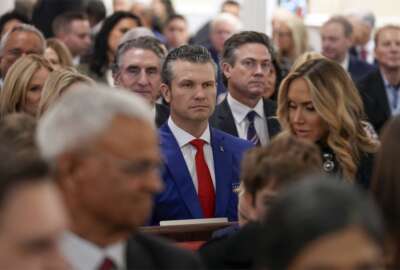Air National Guard unit that was suspended after classified documents leak will restart mission
The unit involved in the documents leak last year has been recertified and will start its mission again after investigations, improvements and inspections.
WASHINGTON (AP) — The Air National Guard intelligence unit involved in the massive classified documents leak by an airman last year has been recertified and will return to its mission on Saturday after months of investigations, improvements and inspections, the Air Force said.
The 102nd Intelligence, Surveillance and Reconnaissance Group was suspended in mid-April 2023 after Massachusetts Air National Guard member Jack Teixeira was arrested over leaking highly classified military documents about the war in Ukraine and other national security secrets.
Gen. Kenneth Wilsbach, who heads Air Combat Command, approved the recertification of the unit after an inspection team did a final review, Air Force spokeswoman Ann Stefanek said Friday. She said Defense Secretary Lloyd Austin and Air Force Secretary Frank Kendall concurred with the decision.
A team from the 480th Intelligence Wing at Joint Base Langley-Eustis, Virginia, spent two weeks watching the unit do its mission as the final step in the review process.
In a statement Friday, the Massachusetts National Guard said the airmen look forward to returning to their mission.
“With the knowledge gained from this challenging experience, we welcomed the opportunity to help identify problems with Air Force processes that could jeopardize the safe handling of classified information in both the active duty and reserve components,” the Guard said, adding that the Wing implemented changes to ensure any unauthorized disclosure of classified information doesn’t happen again.
The ISR group is part of the 102nd Intelligence Wing, based at Otis Air National Guard Base in Cape Cod, Massachusetts. As part of the recertification process, the Wing put in a new organizational structure to improve oversight of the group’s operations, made a number of required changes in other security procedures and fixed other problems that were identified in an investigation by the Air Force inspector general, Stefanek said.
The leaks raised questions about how a single airman could remove documents undetected, why there were no security procedures in place to prevent it and how the documents lingered online for months without anyone realizing it. There are strict rules for the handling of top secret information across the military.
The inspector general’s investigation, released last December, found a wide range of security failures and concluded that multiple officials intentionally did not take action on Teixeira’s suspicious behavior. The Air Force disciplined 15 personnel in connection with the problems, ranging from removing people from command posts to other non-judicial actions, such as putting letters in service members’ files.
According to the review, personnel had access to classified documents without supervision and there were instances when Teixeira was caught violating security policies but those who caught him took no action.
Teixeira worked as a cyber transport systems specialist, essentially an information technology specialist responsible for military communications networks. He was part of a three-person crew that had unsupervised access at night to an open storage facility to perform maintenance inspections.
He pleaded guilty on March 4 to six counts of willful retention and transmission of national defense information under the Espionage Act. The 22-year-old acknowledged illegally collecting some of the nation’s most sensitive secrets and sharing them with other users on Discord, a social media platform popular with people playing online games.
The plea deal calls for him to serve at least 11 years in prison, and his sentencing is scheduled for September in Boston.
Copyright © 2025 The Associated Press. All rights reserved. This website is not intended for users located within the European Economic Area.







